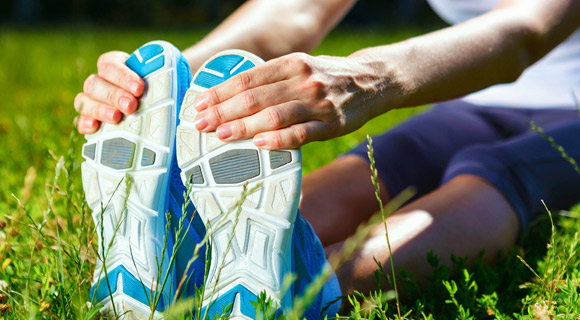
Play it safe: Prevent sports injuries
Prevent sports injuries
Exercise is good for you and your family, but you can injure yourself, and more than half of all sports injuries occur in children. Learn how pacing yourself, exercising smart, and the right protective gear can protect you and your family from injuries.
Pace yourself
Everyone gets sore muscles now and then, but pain is your body’s way of telling you to stop or slow down. Most exercise injuries are a result of pushing too hard, so pace yourself:
- Gradually increase how long, how hard, and how often you exercise.
- Remember to warm up. Warm muscles are less susceptible to injuries.
- Schedule rest days to help your body recover and prevent overuse and fatigue.
Email your doctor or make an appointment if you have pain that doesn’t go away after you stop exercising.
Exercise smart
Practice makes perfect. Learn and practice correct movement and alignment,
which help to prevent injuries during baseball, softball, and many other activities.
Cross-train. It boosts your skill level while reducing your risk of overuse injuries.
Drink up, especially on warm or humid days. Drinking when you’re thirsty usually works for most people, but be careful not to drink too much.
Gear up
Wearing sunscreen, the right clothing, and appropriate protective gear can make a big difference in keeping you and your kids safe from injuries:
Make sure protective pads, mouth and wrist guards, helmets, gloves, and other equipment fit well, are appropriate to the sport and player position, and are in good condition. Gear that’s not properly maintained might not protect fully.
Always wear a helmet for biking, skating, skiing, snowboarding, and riding a horse.
Protect your kids
Teach your kids about safety by practicing it yourself. When you wear safety gear and follow the rules, you show your kids how to exercise smart. Listen to our podcast to get tips on preventing and treating common injuries. Don’t play your child’s sport? Learn about preventing injuries for your child’s sport.
Be careful about head injuries. Take your child to the doctor right away if he or she has had a concussion or a significant head injury, even if he or she no longer has symptoms, before allowing him or her to return to the game.
Sports injuries
Achilles tendon problems
Anterior cruciate ligament (ACL) injuries
Arm injuries
Back pain and low back pain
Blisters
Concussion
Elbow injuries
Eye injuries
Facial injuries
Finger, hand, and wrist injuries
Genital problems and injuries (males)
Groin problems and injuries
Head injuries
Head injuries, returning to play
Hernia (sports)
Hip injuries
Knee problems and injuries
Leg injuries
Mouth and dental injuries
Neck problems and injuries
Nose injuries
Patellar tracking disorder
Plantar fasciitis
Rotator cuff disorders
Scrapes
Shoulder problems and injuries
Tendon injury
Tennis elbow
Toe, foot, and ankle injuries
Weather-related injuries
Cold temperature exposure
Heat-related illnesses
Marine stings and scrapes
Sunburn
Tick bites
Reviewed by: Robert Sallis, MD, March 2014
Additional Kaiser Permanente reviewers
©2014 Kaiser Permanente
TOPICSExercise & Weight LossFamilyKidsSafetySports & Fitness





